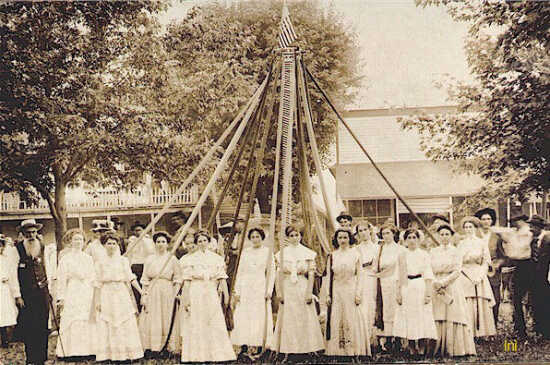Montevallo monument dedication April 14

Editor's note: This continues the Daily Mail series on the namings of area towns that has previously dealt with Nevada, Sheldon, Moundville, Metz and Deerfield.
MONTEVALLO -- The peaceful-sounding name of this southeast Vernon County village greatly belies its history.
Bushwhacker Museum board member Eldon Steward in Nevada is working with former Museum Coordinator Terry Ramsey and others to dedicate a monument commemorating the Civil War strife that took place in this area with the battles of the Church in the Woods, Horse Creek and Old Montevallo.
Steward said the dedication date will be the 150th anniversary of the April 14, 1862, fight at the Scobey Hotel, after which the surviving federal troops burned the prosperous town of some 300 people to the ground.
Historians say Old Montevallo had three hotels, three stores, a blacksmith shop, a livery stable, a sawmill and corn cracker, a dram shop, or pharmacy, 50 houses and The Academy school with two teachers and 200 students.
The monument will be placed at the southeast corner of the stone school building that was constructed after the war on the town square.
"The Battle of Montevallo started at 4:30 a.m. and they fought 'til daylight," said Steward, who grew up on a farm three miles southeast of here.
Asked the origin of the town's name, he chuckled and said, "I just know what I have read in the histories. They looked at the mountains and valley and called it Montevallo. When I was a kid, the old men said, 'I'm going to run up to Monte a little while.'"
The town today is a shadow of its pre-Civil War state with a few homes and the square with the school and other vacant buildings, but the 2010 Census counted 265 people in the five-by-eight-mile Montevallo Township.
The 1887 History of Vernon County, Mo., and 1955 Vernon County Story say the Rev. Thomas German, Vernon County's first school commissioner, coined the name from the Spanish "monte" for "mountain" and "vallo" for "valley" soon after founder William Withers opened a store in 1850.
The scattered ruins of the original settlement lie 1 1/2 miles northwest of here on a farm owned by Don Garber, whose descendant, Ohio native Demas Garber, was reported farming there in 1887. "Nearly every acre of ground was the scene of some incident worthy of record during the war," that history says.
"Every crossroad was the locality of a skirmish, every patch of timber through which a road ran the scene of an ambuscade and every schoolhouse and prairie field a mustering place or drill ground. Many a dale and roadway witnessed a sickening tragedy nonetheless horrible for its privacy and swiftness of execution.
"In some respects the land is like that in Greece, where history gives to every road a page."
The History of Vernon County said at least 36 men, including 28 southerners, died around Montevallo during the war, one reason having been the nearness of Confederate Col. John T. Coffee's Camp with 250 men four miles southeast of town.
Main Street was the northwest to southeast-running road from Fort Scott, Kan., and Nevada to Springfield. "Montevallo was Confederate in her sympathies from the first," the history said.
"Led by Capt. James M. Gatewood of the Missouri State Guard, the able-bodied men formed themselves into a company before President Lincoln was inaugurated. This company was one of the first to spring to arms in all Missouri and in the desperate Battle of Wilson's Creek (southwest of Springfield), more than half its number were killed or wounded.
"The first federal troops that came in were welcomed with bloody hands to hospitable graves.
"It was in March 1862 that a detachment of the 1st Iowa Cavalry reached town.
"Notwithstanding that they came with fair speeches and deported themselves like gentlemen, no confidence was reposed in them and no love felt. They were bushwhacked before morning."
